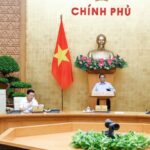1. Staying steadfast to the goal of national independence and socialism is a wise and correct choice made by our Party since its inception and throughout the revolutionary leadership. It is the root cause of all victories in the struggle for national liberation and reunification in the past as well as in the cause of national construction and defense today.
The socialism that we are building, as President Ho Chi Minh once emphasized, is to “make the country rich and strong” [1]; with characteristics of “a rich people, strong country, democracy, fairness, civilization; by the people, for the people, and with the Communist Party’s leadership; having friendly and cooperative relations with countries around the world” [2].
Marx’s theory of socioeconomic formation proves that human physical production activities are the basis, source, and most decisive factor in social transformation; production is the fundamental activity that generates and develops human social relations, promotes cooperation, and competitive elements that drive production to new heights. It is also the basis for the formation, transformation, and development of human society.
According to Marx’s view, social change is essentially and foremost a change in the material production foundation, and the change in material production is the most critical central change that determines social transformation. In the process of social transformation, changes in the economic structure lead to changes in the social structure and the system of values and social norms.
Based on the “obvious truth… that people must first of all eat, drink, accommodate themselves, and clothe themselves before they can engage in politics, religion, etc.” [3], Marxism points out that for humans to live, exist, and develop, it is inevitable that they must produce material wealth for society. At the same time, “the distinguishing feature of economic epochs is not their production but how they produce and with what means of production they produce” [4].
Additionally, according to Lenin, high labor productivity reflects the superiority of socialism over capitalism and is the most important criterion and the key to the victory of socialism. “Ultimately, labor productivity is the most important and decisive factor in the victory of the new system. Capitalism created unprecedented productivity under the feudal system of serfdom. Capitalism can and will be completely defeated by socialism, which offers even higher productivity” [5].
Thus, to successfully build socialism with the characteristics defined in the Party’s Platform for the Construction of the Country in the Transitional Period to Socialism (supplemented and developed in 2011), physical production activities of humans are of paramount importance, with high labor productivity as the key factor.
Through physical production activities, we build the material-technical foundation of socialism, creating positive social changes, overcoming limitations and shortcomings, and building a new socialist person with a warm and free life and happiness and comprehensive development. Thus, we complete the transitional period to socialism and move on to the higher stage of communist socio-economic formation, as Marx predicted in the Critique of the Gotha Program: “When, along with the development of the productive forces, the productive forces of the individual also increase, and when all the springs of cooperative wealth flow more abundantly—only then can narrow-mindedness towards the rights of those who produce be entirely overcome, and society inscribe on its banner: From each according to his ability, to each according to his needs” [6].
2. The reality of economic development, especially the private economy in China and Russia, as well as the 40 years of renewal in Vietnam, has left extremely valuable lessons.
In Russia, even during the period of developing a centralized planned economy, Lenin’s New Economic Policy, which promoted the development of economic sectors, including the private sector, from 1921 to 1991, helped the Russian economy grow tremendously. During this period, Russia, along with many other underdeveloped countries in the Soviet Union, became a powerhouse in many fields such as energy, industry, and aerospace.
In China, starting with the “Reform and Opening-Up” policy in 1978, amending the constitution in 1988 to strengthen the protection of the rights and interests of private enterprises, recognizing private economy as an important part of the socialist market economy at the 15th National Congress of the Communist Party of China in 1997, and committing to protecting the rights and interests of individual and private businesses, China’s private economy has witnessed explosive growth. Many large conglomerates have emerged, not only dominating the domestic market but also reaching out to the international market and playing an important role in technology, telecommunications, and e-commerce.
A series of private enterprises, which account for the majority in industries such as manufacturing and services, especially high-tech, contribute more than 60% of GDP, create 80% of urban employment, and account for over 70% of inventions and innovations in China’s economy.
In Vietnam, with the multi-sector economy officially recognized in the documents of the Party’s Sixth Congress, encouraging and creating conditions for the development of the private economy at the Seventh Congress and continuing to emphasize at the Eighth Congress, there has been progress at the Ninth Congress when our Party affirmed that private capitalist economy is an important and long-term component in the socialist-oriented market economy. For the first time, a resolution was issued on “Continuing to renew mechanisms and policies, encouraging and creating conditions for the development of the private economy”; emphasizing the important role and being one of the driving forces of the economy and specifically regulating the issue of Party members doing private business at the Tenth Congress. At the Twelfth and Thirteenth Congresses, the Party strongly and decisively affirmed the role of the private economy as an important driving force of the economy. The private economy has made remarkable progress.
From barely surviving under the mechanism of bureaucratic centralism and subsidy, facing discrimination not only in social consciousness but also in the mechanism and policies of the State, the private economy has risen strongly in the renewal period, contributing more and more to the State budget, creating jobs for society, promoting potential and advantages in each locality and the whole country, making essential contributions to socio-economic development, consolidating national defense and security, and affirming its role and driving force in international integration.
It can be seen that with a correct vision and policy, in a socialist-oriented market economy, developing the private economy is a vital choice to promote physical production, create social change, “leapfrog” in technology, vocational training, enhance capital absorption capacity, increase labor productivity, and build a material-technical foundation for socialism.
To develop the private economy, the most important and core issue is to continue to improve the socialist-oriented market economic institution, with turning-point changes in thinking, perception, and action, forming the basic characteristics of a socialist-oriented market economy managed by the State under the leadership of the Party compared to a socialist-oriented market economy managed by the State in the past.

3. On May 4, 2025, the Politburo issued Resolution No. 68-NQ/TW on private economic development, with unprecedented goals, views, tasks, and breakthrough solutions; shaping the Party’s new vision on developing the private economy in a socialist-oriented market economy managed by the State under the leadership of the Party; promoting the strong development of the private economy – a new driving force for economic development in the coming time. To implement Resolution 68 successfully, it is necessary to focus on implementing a number of urgent tasks as follows:
First, vigorously and effectively implement the work to bring the Party’s Resolution into life. Right at the 9th session of the 15th National Assembly, the National Assembly will discuss and issue a resolution on private economic development with specific, feasible, and effective incentive mechanisms and policies. Establish a National Steering Committee for the implementation of Resolution 68, headed by the Prime Minister, to periodically review and urge the implementation of the Resolution by ministries, sectors, and localities, absolutely not letting the situation of confusion and separate implementation that reduces the effectiveness of the Central’s policies.
Regularly publicize the implementation results, making this one of the criteria for evaluating the capacity and performance of tasks, especially for the leaders. Promote a strong change in administrative thinking from control to companionship, considering enterprises as “serving” objects instead of “managing” objects, ensuring the principle of “walking the talk” in the whole political system. The Government soon issues a Directive requiring ministries, sectors, and localities to shift all administrative procedures to post-inspection, except for some specific fields (security, defense…); with specific guidance on the responsibility of the heads of Party committees and authorities at all levels in supporting enterprises, associated with emulation and rewards; standardize the entire investment licensing process according to the electronic model, shortening the time for announcing results.
Second, urgently institutionalize the Party’s views into law and ensure strict implementation in the whole political system, enterprises, and people. Study to build a Law on Private Economic Development and amend and supplement related legal regulations to fully institutionalize the orientations mentioned in Resolution 68. Establish a system of fair competition, clearly define the list of acts that negatively affect market access and discriminate against private enterprises in market competition.
Create a mechanism to promote investment and financial support, requiring financial organizations to establish a credit evaluation system suitable for the private economy and provide financial support. Encourage the development of science and technology, with private enterprises taking the lead in major and key national projects and establishing national research and innovation infrastructure.
Establish a system to protect the rights and interests of market participants, clearly distinguishing between economic disputes and criminal offenses, strictly prohibiting acts of abusing the law in market management. Provide measures to support procedures, policies, and services for the private economy, standardize administrative procedures and policies. Amend the Penal Code to separate fraud and profiteering from ordinary administrative errors.
Third, pay special attention to supporting small and micro-enterprises, promoting a society with an entrepreneurial mindset and aspiration for mastery, especially in the field of innovation. Immediately deploy a preferential credit package for small and medium-sized enterprises through the state credit guarantee fund. Allocate 5-10% of priority land in high-tech industrial parks for startups at preferential prices. Expand the national legal sandbox model, allowing practical trials for fintech, AI, and digital agriculture within a clear legal protection framework. Build free or subsidized legal consulting centers for small and medium-sized enterprises in localities.
Fourth, build a team of entrepreneurs who truly become “soldiers” on the economic front, participating substantively in policy formulation. Protect, support, encourage, and honor entrepreneurs with patriotism, national pride, awareness of law compliance, aspirations to get rich for themselves and contribute to the richness of the country, with knowledge and business management capacity in a market economy, and responsibility for employees and the community.
Create favorable conditions for entrepreneurs to participate in policy criticism and contribute to the process of strategy formulation and implementation. When building laws and decrees, ministries and sectors need to listen carefully to the opinions of the people and enterprises, especially practical entrepreneurs.
Support the budget and expertise to build strong, independent, and capable industry associations to criticize policies. Encourage the establishment of a National Private Enterprise Council to directly advise the Government on long-term economic and industrial strategies.
We have a tradition of resilience and patriotism, a solid theoretical, practical, political, and legal basis, with aspirations, will, unity, and high determination of the entire political system, enterprises, entrepreneurs, and the whole people to achieve the goal of “stability, high-quality development, and improvement of people’s lives in all aspects”. We will certainly implement the Resolution successfully, soon promoting the private economy to develop to its worth, truly becoming the most important driving force and pillar for the stable and strong development of the national economy, realizing the aspiration to build a rich, strong, democratic, equitable, and civilized socialist Vietnam.
——-
[1] Ho Chi Minh, Toan Tap, National Political Publishing House, Hanoi, 2011, Vol. 9, p. 446.
[2] Van Kien Dai Hoi Dang Thoi Ky Doi Moi, Tap 2, National Political Publishing House, Hanoi, 2019, p. 502.
[3] Mac va Anghen, Toan Tap, National Political Publishing House, Hanoi, 2002, Vol. 19, p. 166.
[4] Mac va Anghen, Toan Tap, sdd, Vol. 23, p. 269.
[5] V.I. Lenin, Toan Tap, National Political Publishing House, Hanoi, 2005, Vol. 39, p. 25.
[6] Mac va Anghen, Toan Tap, sdd, Vol. 19, p. 36.
Unlocking Institutional Bottlenecks: Navigating the Complexities for a Smoother Journey Ahead
Speaking at the 8th session of the 15th National Assembly on October 21, 2024, General Secretary To Lam expressed the view that institutional bottlenecks are the main hindrance to progress. He emphasized that addressing these institutional bottlenecks, starting with improvements in law-making, is an urgent task for the National Assembly.
The Power of Reform: Embracing Truth and Objectively Recognizing Limitations
On August 22nd, in Hanoi, the Steering Committee for Summarizing Theoretical and Practical Issues on 40 years of Renewal towards Socialism in Vietnam (Steering Committee for 40 years of Renewal) held its fourth meeting, presided over by General Secretary and President To Lam.










































